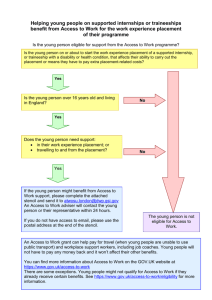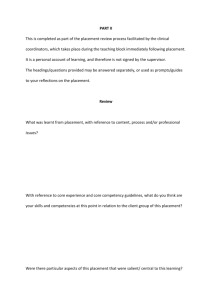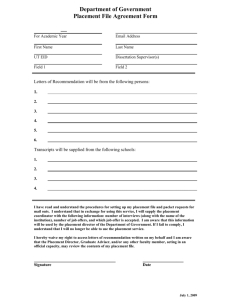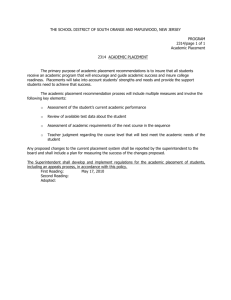Professional Capability Framework - End of First Placement Level
advertisement
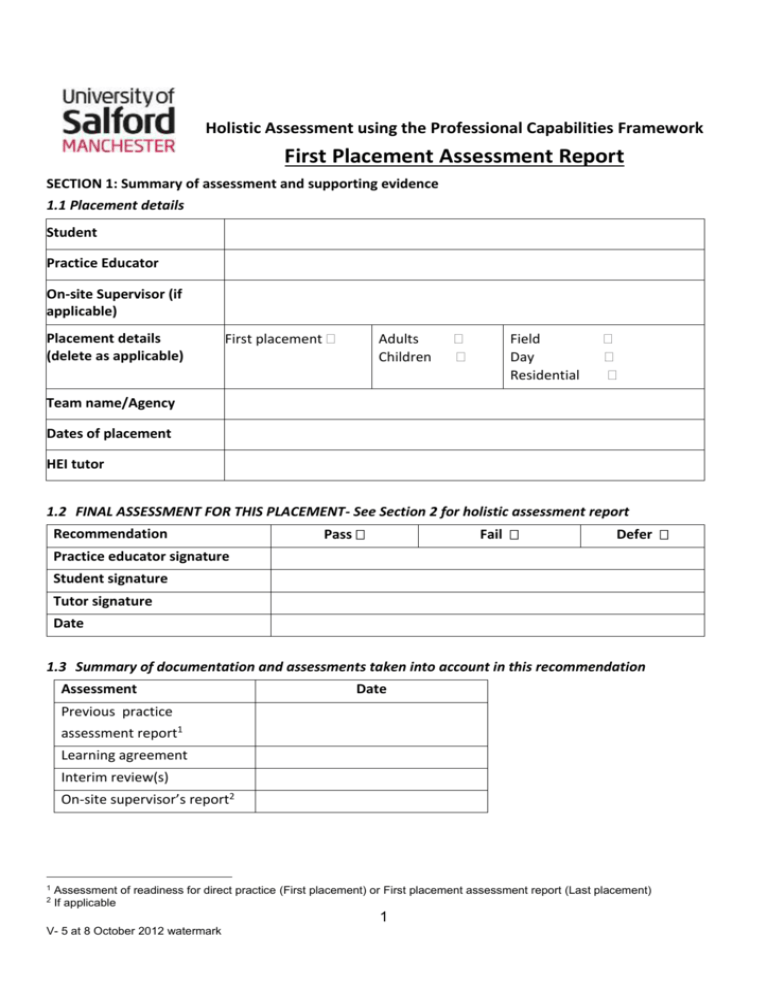
Holistic Assessment using the Professional Capabilities Framework First Placement Assessment Report SECTION 1: Summary of assessment and supporting evidence 1.1 Placement details Student Practice Educator On-site Supervisor (if applicable) Placement details (delete as applicable) First placement Adults Children Field Day Residential Team name/Agency Dates of placement HEI tutor 1.2 FINAL ASSESSMENT FOR THIS PLACEMENT- See Section 2 for holistic assessment report Recommendation Pass Fail Defer Practice educator signature Student signature Tutor signature Date 1.3 Summary of documentation and assessments taken into account in this recommendation Assessment Date Previous practice assessment report1 Learning agreement Interim review(s) On-site supervisor’s report2 1 2 Assessment of readiness for direct practice (First placement) or First placement assessment report (Last placement) If applicable 1 V- 5 at 8 October 2012 watermark 1.4 Summary of any issues or circumstances taken into account in this recommendation (please give brief summary and attach additional information in a report if relevant e.g. investigation of a complaint, dyslexia assessment) Issue Brief description (max 150 words each)3 Additional information? Placement e.g. YES/NO workload, PE and/or organisational factors etc. Student e.g. YES/NO health, personal circumstances, disability etc. 1.5 Summary of evidence linked to the PCF used to support this recommendation Type of evidence List title(s) of documents used in each category with dates Direct Observations Service User and Carer feedback Critical reflection of practice Extracts from supervision notes Student work products Other e.g. presentations 3 Additional summary information can be appended if required 2 V- 5 at 8 October 2012 watermark SECTION 2: Assessment Report Holistic assessment PCF level descriptor By the end of the first placement students should demonstrate effective use of knowledge, skills and commitment to core values in social work in a given setting in predominantly less complex situations, with supervision and support. They will have demonstrated capacity to work with people and situations where there may not be simple clear-cut solutions. (see appendix for the end of first placement level descriptors) Please provide an overall judgement of the student’s professional capability with reference to the level descriptor for this placement, taking into account: Capability across all nine domains of the PCF Progressive assessment of the candidate’s capability during the placement Any factors that may have affected the student’s progress during the placement Link your comments to examples of evidence presented over the course of the placement and, if appropriate, information provided in Section 3 to support the overall assessment. (Guideline approx 500 words ) Feedback on overall capability Cross reference with evidence 3 V- 5 at 8 October 2012 watermark Assessment of student’s future learning need/priorities (Guideline approx. 200 words) Student’s comments on assessment (Guideline approx. 300 words) Tutor’s comments on the assessment (Guideline approx. 200 words) 4 V- 5 at 8 October 2012 watermark SECTION 3: Holistic assessment of each domain Please provide additional information to support your overall assessment in Section 2. This will be essential if the student has not demonstrated capability in one or more of the domains, or you have other, specific concerns. You may also wish to comment on other relevant evidence from the placement you have not discussed in Section 2, for example, highlighting a student’s strengths, progress or areas for development in a particular domain. (Guideline approx 250 words maximum per domain) Domain 1 Professionalism Identify and behave as a professional social worker, committed to professional development Social workers are members of an internationally recognised profession, a title protected in UK law. Social workers demonstrate professional commitment by taking responsibility for their conduct, practice and learning, with support through supervision. As representatives of the social work profession they safeguard its reputation and are accountable to the professional regulator. Assessment Evidence used to support judgement Capability at level for this placement Demonstrated Not demonstrated Domain 2 Values and Ethics Apply social work ethical principles and values to guide professional practice Social workers have an obligation to conduct themselves ethically and to engage in ethical decisionmaking, including through partnership with people who use their services. Social workers are knowledgeable about the value base of their profession, its ethical standards and relevant law. Assessment Evidence used to support judgement Capability at level for this placement Demonstrated Not demonstrated 5 V- 5 at 8 October 2012 watermark Domain 3 Diversity Recognise diversity and apply anti-discriminatory and anti-oppressive principles in practice Social workers understand that diversity characterises and shapes human experience and is critical to the formation of identity. Diversity is multidimensional and includes race, disability, class, economic status, age, sexuality, gender and transgender, faith and belief. Social workers appreciate that, as a consequence of difference, a person’s life experience may include oppression, marginalisation and alienation as well as privilege, power and acclaim, and are able to challenge appropriately. Assessment Evidence used to support judgement Capability at level for this placement Demonstrated Not demonstrated Domain 4 Rights, Justice and Economic Wellbeing Advance human rights and promote social justice and economic well-being Social workers recognise the fundamental principles of human rights and equality, and that these are protected in national and international law, conventions and policies. They ensure these principles underpin their practice. Social workers understand the importance of using and contributing to case law and applying these rights in their own practice. They understand the effects of oppression, discrimination and poverty. Assessment Evidence used to support judgement Capability at level for this placement Demonstrated Not demonstrated 6 V- 5 at 8 October 2012 watermark Domain 5 Knowledge Apply knowledge of social sciences, law and social work practice theory Social workers understand psychological, social, cultural, spiritual and physical influences on people; human development throughout the life span and the legal framework for practice. They apply this knowledge in their work with individuals, families and communities. They know and use theories and methods of social work practice. Assessment Evidence used to support judgement Capability at level for this placement Demonstrated Not demonstrated Domain 6 Critical reflection and Analysis Apply critical reflection and analysis to inform and provide a rationale for professional decision-making Social workers are knowledgeable about and apply the principles of critical thinking and reasoned discernment. They identify, distinguish, evaluate and integrate multiple sources of knowledge and evidence. These include practice evidence, their own practice experience, service user and carer experience together with research-based, organisational, policy and legal knowledge. They use critical thinking augmented by creativity and curiosity. Assessment Evidence used to support judgement Capability at level for this placement Demonstrated Not demonstrated 7 V- 5 at 8 October 2012 watermark Domain 7 Intervention and Skills Use judgement and authority to intervene with individuals, families and communities to promote independence, provide support and prevent harm, neglect and abuse Social workers engage with individuals, families, groups and communities, working alongside people to assess and intervene. They enable effective relationships and are effective communicators, using appropriate skills. Using their professional judgement, they employ a range of interventions: promoting independence, providing support and protection, taking preventative action and ensuring safety whilst balancing rights and risks. They understand and take account of differentials in power, and are able to use authority appropriately. They evaluate their own practice and the outcomes for those they work with. Assessment Evidence used to support judgement Capability at level for this placement Demonstrated Not demonstrated Domain 8 Contexts and organisations Engage with, inform, and adapt to changing contexts that shape practice. Operate effectively within own organisational frameworks and contribute to the development of services and organisations. Operate effectively within multi-agency and inter-professional settings Social workers are informed about and pro-actively responsive to the challenges and opportunities that come with changing social contexts and constructs. They fulfill this responsibility in accordance with their professional values and ethics, both as individual professionals and as members of the organisation in which they work. They collaborate, inform and are informed by their work with others, interprofessionally and with communities. Assessment Evidence used to support judgement Capability at level for this placement Demonstrated Not demonstrated 8 V- 5 at 8 October 2012 watermark Domain 9 Professional Leadership Take responsibility for the professional learning and development of others through supervision, mentoring, assessing, research, teaching, leadership and management The social work profession evolves through the contribution of its members in activities such as practice research, supervision, assessment of practice, teaching and management. An individual’s contribution will gain influence when undertaken as part of a learning, practice-focused organisation. Learning may be facilitated with a wide range of people including social work colleagues, service users and carers, volunteers, foster carers and other professionals. Assessment Evidence used to support judgement Capability at level for this placement Demonstrated Not demonstrated SIGNATURES Student Practice Educator Date APPENDIX 9 V- 5 at 8 October 2012 watermark Professional Capability Framework - End of First Placement Level Capabilities: By the end of the first placement students should demonstrate effective use of knowledge, skills and commitment to core values in SW in a given setting in predominantly less complex situations, with supervision and support. They will have demonstrated capacity to work with people and situations where there may not be simple clear-cut solutions. 1. Professionalism: - Identify and behave as a professional social worker, committed to professional development Social workers are members of an internationally recognised profession, a title protected in UK law. Social workers demonstrate professional commitment by taking responsibility for their conduct, practice and learning, with support through supervision. As representatives of the social work profession they safeguard its reputation and are accountable to the professional regulator. Recognise the role of the professional social worker in a range of contexts Recognise the important role of supervision, and make an active contribution Demonstrate professionalism in terms of presentation, demeanour, reliability, honesty and respectfulness With guidance take responsibility for managing your time and workload effectively Be able to show awareness of personal and professional boundaries With guidance recognise your limitations, and how to seek advice Recognise and act on own learning needs in response to practice experience Show awareness of own safety, health, wellbeing and emotional resilience and seek advice as necessary Identify concerns about practice and procedures and how they can be questioned 2. Values and Ethics: Apply social work ethical principles and values to guide professional practice. Social workers have an obligation to conduct themselves ethically and to engage in ethical decision-making, including through partnership with people who use their services. Social workers are knowledgeable about the value base of their profession, its ethical standards and relevant law. Understand and, with support, apply the profession’s ethical principles Understand and, with support, apply the profession’s ethical principles Recognise and with support manage the impact of own values on professional practice. Identify and, with guidance, manage potentially conflicting values and ethical dilemmas Elicit and respect the needs and views of service users and carers and, with support, promote their participation in decision-making wherever possible Recognise and, with support, promote individuals’ rights to autonomy and self-determination Promote and protect the privacy of individuals within and outside their families and networks, recognising the requirements of professional accountability and information sharing 10 V- 5 at 8 October 2012 watermark 3. Diversity: Recognise diversity and apply anti-discriminatory and anti-oppressive principles in practice Social workers understand that diversity characterises and shapes human experience and is critical to the formation of identity. Diversity is multi-dimensional and includes race, disability, class, economic status, age, sexuality, gender and transgender, faith and belief. Social workers appreciate that, as a consequence of difference, a person’s life experience may include oppression, marginalisation and alienation as well as privilege, power and acclaim, and are able to challenge appropriately. Understand how an individual’s identity is informed by factors such as culture, economic status, family composition, life experiences and characteristics, and take account of these to understand their experiences With reference to current legislative requirements, recognise personal and organisational discrimination and oppression, and identify ways in which they might be challenged Recognise and, with support, manage the impact on people of the power invested in your role 4. Rights, Justice and Economic Wellbeing: Advance human rights and promote social justice and economic well-being Social workers recognise the fundamental principles of human rights and equality, and that these are protected in national and international law, conventions and policies. They ensure these principles underpin their practice. Social workers understand the importance of using and contributing to case law and applying these rights in their own practice. They understand the effects of oppression, discrimination and poverty. Understand and, with support, apply in practice the principles of social justice, inclusion and equality Understand how legislation and guidance can advance or constrain people’s rights Work within the principles of human and civil rights and equalities legislation Recognise the impact of poverty and social exclusion and promote enhanced economic status through access to education, work, housing, health services and welfare benefits Recognise the value of independent advocacy 5. Knowledge: Apply knowledge of social sciences, law and social work practice theory Social workers understand psychological, social, cultural, spiritual and physical influences on people; human development throughout the life span and the legal framework for practice. They apply this knowledge in their work with individuals, families and communities. They know and use theories and methods of social work practice. With guidance apply research, theory and knowledge from sociology, social policy, psychology, health and human growth and development to social work practice Understand the legal and policy frameworks and guidance that inform and mandate social work practice, relevant to placement setting Understand forms of harm, their impact on people, and the implications for practice Apply knowledge from a range of theories and models for social work intervention with individuals, families, groups and communities, and the methods derived from them Value and take account of the expertise of service users and carers and professionals 6. Critical reflection and Analysis - Apply critical reflection and analysis to inform and provide a rationale for professional decision-making 11 V- 5 at 8 October 2012 watermark Social workers are knowledgeable about and apply the principles of critical thinking and reasoned discernment. They identify, distinguish, evaluate and integrate multiple sources of knowledge and evidence. These include practice evidence, their own practice experience, service user and carer experience together with researchbased, organisational, policy and legal knowledge. They use critical thinking augmented by creativity and curiosity. Recognise the importance of applying imagination, creativity and curiosity to practice Inform decision-making through the identification and gathering of information from more than one source and, with support, question its reliability and validity With guidance use reflection and analysis in practice With guidance understand how to evaluate and review hypotheses in response to information available at the time and apply in practice with support With guidance use evidence to inform decisions Intervention and Skills: Use judgement and authority to intervene with individuals, families and communities to promote independence, provide support and prevent harm, neglect and abuse Social workers engage with individuals, families, groups and communities, working alongside people to assess and intervene. They enable effective relationships and are effective communicators, using appropriate skills. Using their professional judgement, they employ a range of interventions: promoting independence, providing support and protection, taking preventative action and ensuring safety whilst balancing rights and risks. They understand and take account of differentials in power, and are able to use authority appropriately. They evaluate their own practice and the outcomes for those they work with. With guidance use a range of verbal, non-verbal and written methods of communication relevant to the placement With guidance communicate information, advice, instruction and opinion so as to advocate, influence and persuade Demonstrate the ability to build and conclude compassionate and effective relationships appropriate to the placement setting With guidance demonstrate an holistic approach to the identification of needs, circumstances, rights, strengths and risks Identify and use appropriate frameworks to assess, give meaning to, plan, implement and review effective interventions and evaluate the outcomes With guidance use a planned and structured approach, informed by at least two social work methods and models Recognise the importance of community resources, groups and networks for individuals Demonstrate skills in recording and report writing appropriate to the setting With guidance, demonstrate skills in sharing information appropriately and respectfully Demonstrate awareness of the impact of multiple factors, changing circumstances and uncertainty in people’s lives With guidance understand the authority of the social work role With guidance identify the factors that may create or exacerbate risk to individuals, their families or carers, to the public or to professionals, including yourself With guidance identify appropriate responses to safeguard vulnerable people 12 V- 5 at 8 October 2012 watermark 8. Contexts and organisations: Engage with, inform, and adapt to changing contexts that shape practice. Operate effectively within own organisational frameworks and contribute to the development of services and organisations. Operate effectively within multiagency and inter-professional partnerships and settings Social workers are informed about and pro-actively responsive to the challenges and opportunities that come with changing social contexts and constructs. They fulfil this responsibility in accordance with their professional values and ethics, both as individual professionals and as members of the organisation in which they work. They collaborate, inform and are informed by their work with others, inter-professionally and with communities. With guidance, recognise that social work operates within, and responds to, changing economic, social, political and organisational contexts With guidance understand legal obligations, structures and behaviours within organisations and how these impact on policy, procedure and practice With guidance work within the organisational context of your placement setting and understand the lines of accountability Understand and respect the role of others within the organisation and work effectively with them Take responsibility for your role and impact within teams and with guidance contribute positively to team working Understand the inter-agency, multi-disciplinary and inter-professional dimensions to practice and, with guidance, demonstrate partnership working 9. Professional Leadership: Take responsibility for the professional learning and development of others through supervision, mentoring, assessing, research, teaching, leadership and management The social work profession evolves through the contribution of its members in activities such as practice research, supervision, assessment of practice, teaching and management. An individual’s contribution will gain influence when undertaken as part of a learning, practice-focused organisation. Learning may be facilitated with a wide range of people including social work colleagues, service users and carers, volunteers, foster carers and other professionals. Identify how professional leadership in social work can enhance practice Recognise the value of sharing and supporting the learning and development of others 13 V- 5 at 8 October 2012 watermark


